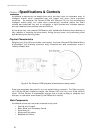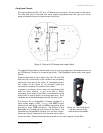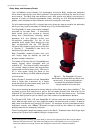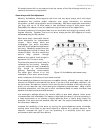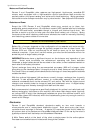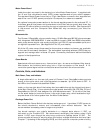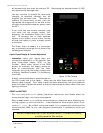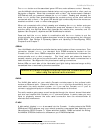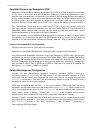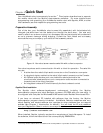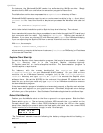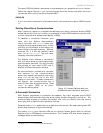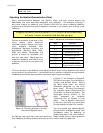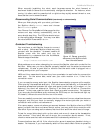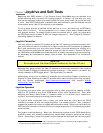Specifications and Controls
PeopleBot Sensors and Emergency STOP
Performance PeopleBot’s tabletop sensors are very reliable diffuse IR detectors mounted
to the front of the robot and which detect obstacles, particularly tabletops or rope
barriers, that otherwise aren’t detected by the sonars. The tabletop IR detectors respond
to any surface except glass or other mirrored surfaces, and can detect objects as thin as
a human finger. They are oriented to trigger when an object is 28 cm (11.5 inches) or
nearer to the front of the robot and 3.75 cm (1.5 inches) at the height of the lower deck.
Two “breakbeam” IR sensors, one on each side 3.75 cm (1.5 inches) forward of the left
and right column struts and between the top and lower Decks of the Performance
PeopleBot, sense objects which intrude into the robot’s profile, but which may not be
otherwise detected by the sonars or tabletop IR sensors.
Since the tabletop and breakbeam IR sensors are connected to User I/O digital ports,
their states are communicated from the P2OS server to a connected client, such as
Saphira, in the standard Server Information Packet. See the . IOpac packet contents
Pioneer 2 Arm-related SIPs and Commands
Please consult the Pioneer 2 Arm Manual for details.
Performance PeopleBot IRs sections in Chapter 6 and in Appendix A for details.
The Performance PeopleBot contains a large, red Emergency STOP button prominently
positioned on the left column just beneath the upper Deck. When pressed, the button
physically disconnects power from the motors and electrically shorts them to brake the
motors. A separate digital sense line to the microcontroller can activate an emergency
stop process in P2OS. See E_STOP and E_STALL in Chapter 6 for details. To release the
Emergency STOP button, press it in and twist.
Safety Watchdogs and Configuration
Pioneer 2’s and PeopleBot’s standard onboard software, P2OS, contains a
communications watchdog that will halt motion if communications between a client
computer and the server are disrupted for a set time interval, nominally two seconds
(watchdog parameter). The robot will automatically resume activity, including motion,
as soon as communications are restored.
P2OS also contains a stall monitor. If the drive exerts a PWM pulse that equals or
exceeds a configurable level and the wheels fail to turn (stallval), motor power is cut
off for a configurable amount of time (stallwait). The server software also notifies the
client which motor is stalled. When the stallwait time elapses, motor power
automatically switches back ON and motion continues under server control.
All these “failsafe” mechanisms help ensure that your robot will not cause damage or be
damaged during operation. You may reconfigure the communications, drive current,
and stallwait values to suit your application. See Chapter 7, Updating &
Reconfiguring P2OS, for details.
18



